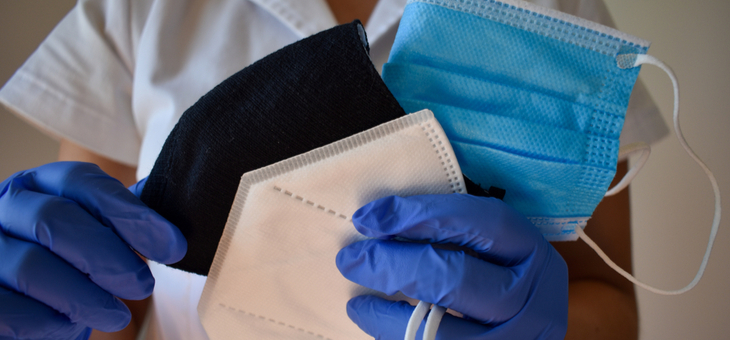When COVID first hit early last year, thousands of sewing machine were pulled out of cupboards and suburban mask-making went into overdrive. Fabric stores were raided and elastic became a coveted item, then fashion designers and businesses got on board and cloth masks became the item du jour.
But were we doing the right thing?
We’ve learnt a lot over the past 18 months and the advice about masks has been a moving feast. The rules differ between the states and territories and depending on where each is in regard to COVID outbreaks. Masks are either encouraged or mandated to limit the risk of air-borne transmission when self-distancing is impossible.
But which mask? So is your homemade or store-bought cloth mask your best option?
Infectious diseases specialist Dr Paul Griffin says that “any mask is better than none”, but the latest federal government advice is that the best protection is via a single-use surgical mask – in conjunction with hand hygiene, social distancing and testing.
Read: The impossibility of herd immunity
“By itself, [a mask] is not a perfect intervention so it doesn’t stop 100 per cent of transmission, but it certainly goes a very long way to reducing it – probably in the order of around 50 per cent or maybe more,” he says.
So can surgical masks be worn several times, given three million are thrown away across the planet every minute and they take an estimated 450 years to break down?
No, says Dr Griffin, they’re designed for single use.
“We don’t want people to recycle those for days or weeks on end,” he says.
“If they do get damaged or soiled or wet in any way, then how well they work will definitely be reduced, so they should be discarded.”
Read: Anti-vaxxers’ latest ploy to bypass contact tracing
So should you bin your cloth mask?
In January, several European countries banned cloth masks and some airlines have done the same, advising passengers that cloth masks are not acceptable and do not offer sufficient protection. But they are still acceptable in Australia, though you should follow these guidelines.
Cloth masks should have three layers of filtering material – two layers of tightly woven material with some sort of filtering material in the middle. Look for masks that will cling to your face, otherwise you’ll have gaps. Bonus points if the mask has a metal prong at the nose. And ties, not ear loops, better control the fit and contour of a mask.
Dr Griffin says the more often you wash your cloth mask the better.
“Every couple of days would be the minimum … because we don’t want things to build up and make them pose a risk in themselves,” he says.
Either handwash your cloth masks or wash in a washing machine and allow them to fully dry.
Are masks here to stay?
Dr Griffin says: “Mask wearing is something we should all become accustomed to, for it to be an ingrained behaviour, so that even when the mandate lifts, if you’re in an environment where you can’t maintain social distancing, well then pop your mask on.
“We just never know when this virus is going to pop back up.”
Read: Carbon monoxide monitors can show a venue’s COVID risk
The federal health department says cloth masks are “significantly less efficient than surgical masks”. It says their effectiveness in blocking respiratory droplets varies depending on the weave and the number of layers, with at least two to three essential.
Prolonged use and reuse without washing and touching or adjusting masks can lead to self-contamination and infection (of the wearer). The department says they are increasingly less effective as they become increasingly damp, adding: “Face masks are most likely to be effective when worn by infected persons to protect others. They may be less effective in protecting uninfected people exposed to a COVID-19-infected person not wearing a mask.”
And what about the correct wearing of masks?
The health department says: “The effectiveness of face masks depends on consistent and correct use, including covering the nose and mouth adequately.”
It adds that touching the front of the mask, pulling it down to smoke, drink or eat and reusing disposable masks can contaminate the hands, the wearer’s face and surfaces.
So is there a preferred surgical mask?
In an extensive review of face masks published late last year in the journal Science Advances, researchers from Duke University in the US found surgical face masks were the second-best option to protect wearers, finishing just behind N95 masks, which are considered the gold standard.
And a final word from the RSPCA: Please “snip the straps” on surgical masks before binning them to prevent threats to our wildlife.
Have you been wearing cloth as opposed to single-use surgical masks? Will you now rethink that practice? Why not share your thoughts in the comments section below?
If you enjoy our content, don’t keep it to yourself. Share our free eNews with your friends and encourage them to sign up.

